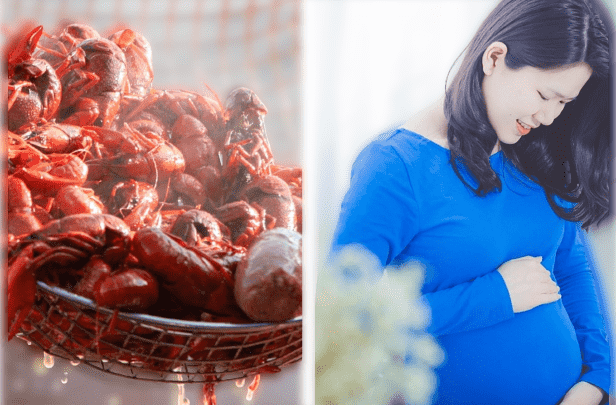Eaten all around the world, crawfish is a delectable seafood dish. Can pregnant women eat crawfish? Making the crustacean might be difficult for expectant mothers. There could be severe health risks for both the mother and the unborn child if the wrong kind of crawfish is consumed during pregnancy.
Here, we’ll briefly summarize the nutritional value of crawfish, talk about which types are potentially safe for expectant mothers to eat, provide advice and cooking tips for those who decide to eat crawfish while pregnant and share some key considerations to bear in mind.
Contents
- 1 Crawfish: An overview of its nutritional content
- 2 Pregnancy diet guidelines and what to avoid?
- 3 What varieties of crawfish are safe to eat?
- 4 Cooking tips for pregnant women who choose to eat crawfish
- 5 Takeaways: Things to remember about eating crawfish while pregnant
- 6 Conclusion: Can Pregnant Women Eat Crawfish? What Varieties Are Safe?
Crawfish: An overview of its nutritional content
Pregnant women can benefit from crawfish’s critical elements as a nutritious seafood alternative. One crawfish tail contains approximately half the daily needed amount of vitamin B12 and 14.5 grams of protein.
Croakers are an essential source of nourishment for developing fetuses despite having little fat and calorie content—just 28 calories and 0.5 grams of fat per tail, respectively. Along with protein and vitamin B12, crawfish are rich in minerals, including iron, magnesium, phosphorus, zinc, calcium, and salt.
Crayfish is also a good source of omega-3 fatty acids, essential for the baby’s development during pregnancy. Because studies have connected inadequate consumption to lower birth weight and early delivery, pregnant moms must ensure they get enough omega-3 fatty acids during their pregnancy.
The high nutritional content of crawfish makes it an excellent addition to a pregnancy-friendly diet. Seeking medical advice from a professional is essential before ingesting any seafood during pregnancy to safeguard the health of both the mother and the fetus.
Pregnancy diet guidelines and what to avoid?
Pregnancy causes many dietary changes, and figuring out what foods are good to eat can be difficult. Expectant mothers should consume healthy meals that provide the nutrients for a successful pregnancy. Several foods should also be avoided during pregnancy to protect the mother and the unborn child.
Pregnant women should steer clear of eggs, deli meats, raw or undercooked fish, and unpasteurized dairy products. Additionally, during this period, steer clear of species high in mercury, such as swordfish, shark, king mackerel, and tilefish. In addition, raw or undercooked seafood (like sushi and sashimi) should not be eaten. Caffeine intake should be limited, and alcohol should be avoided entirely when pregnant.
Not only should pregnant women avoid certain foods, but they should also focus on eating nutrient-dense foods such as whole grains, fruits, vegetables, lean proteins (chicken and fish as long as they’re cooked thoroughly), beans, nuts, seeds, and nut butter, low-fat dairy products like milk yogurt, legumes, healthy fats like olive oil, and lots of water throughout the day. Eating various foods gives you the vitamins and minerals needed for a healthy pregnancy.
An expectant mother should exercise all reasonable caution when choosing foods because she knows that what she eats during her pregnancy affects the health of her unborn child. Following these guidelines and focusing on nutrient-rich foods can help protect you against potential foodborne illnesses and ensure that you provide your baby with all the nutrients they need for healthy development.
What varieties of crawfish are safe to eat?
When ingesting cooked crawfish while pregnant, it is imperative to get it from a reliable supplier. Wild-caught crawfish are not recommended for consumption due to the possibility of dangerous toxins like mercury present. Because farmed crawfish are frequently housed in regulated conditions with stringent safety guidelines, they can be a reliable substitute.
Ensure the seafood has been cooked and kept correctly if you plan to eat farmed crawfish while pregnant. Keep crawfish refrigerated at all times; do not leave them at room temperature for more than two hours. Before serving, seafood must be cooked to an internal temperature of 145 degrees Fahrenheit or higher and rested for at least 15 seconds. Any leftovers should be eaten within a day or two of cooking and stored in an airtight container.
Additionally, seafood has high levels of mercury, which can be harmful to a developing fetus if taken in excess. Therefore, pregnant women should steer clear of it. Furthermore, because of possible allergies or other dietary restrictions unique to each woman’s circumstances, it is advised that pregnant women speak with their doctor or a dietitian before including any seafood in their diet.
Lastly, if farmed crawfish is prepared by strict guidelines and consumed in moderation from a reliable source, it may be a safe choice for expectant mothers. It is usually recommended for expectant mothers to talk to their healthcare provider about including seafood in their diet. As a result, they can receive customized advice based on their needs and preferences.
Cooking tips for pregnant women who choose to eat crawfish
Cooking crawfish correctly is essential, especially for expecting mothers who enjoy seafood. To ensure safety, there are several rules to follow when handling and preparing raw crawfish. First, avoid other natural foods such as raw dairy, eggs, and shellfish. Crabs that have been cooked should be eaten two hours after being prepared to ensure food safety.
It might be more cost-effective to buy pre-cooked frozen or canned crawfish rather than freshly prepared ones. You may help eliminate dangerous bacteria while cooking raw crawfish at home by diluting the boiling water with vinegar or lemon juice. Cooked and cooled, crawfish will be kept for three days in the fridge or sealed freezer-safe containers for up to six months.
Pregnant women should also thoroughly wash their hands after handling raw seafood. After using soap and warm water, rinse with fresh water. Cleaning tools used in preparing food are also essential to prevent cross-contamination with other foods to which the raw fish may have come into contact.
Pregnant women can eat this health-promoting shellfish without jeopardizing their unborn child by using these safe preparation and storage guidelines for crawfish. Before including any seafood in their diet, it is usually advisable for expectant mothers to speak with their doctor or a nutritionist. They should also refer to the nutritional recommendations provided by medical professionals for a generally healthy pregnancy diet.
Takeaways: Things to remember about eating crawfish while pregnant
There are a few essential considerations to consider when eating crawfish while expecting. First, crawfish is an excellent complement to a nutritious pregnant diet and offers many nutritional benefits. It is low in calories and fat and high in protein, minerals, vitamin B12, and omega-3 fatty acids. Pregnant women should, however, avoid shellfish unless advised otherwise by a physician or nutritionist.
Second, because some species of crawfish may contain mercury, which harms both mother and child, they should only be consumed boiled. Suppose pregnant women buy pre-cooked crawfish from a reliable supplier. In that case, they should ensure the shellfish is handled correctly and stored carefully to prevent cross-contamination with other raw foods. Because seafood contains a lot of mercury, pregnant women should refrain from consuming it.
Finally, the following advice may be of use to anyone thinking about consuming crawfish while expecting: When incorporating seafood into your diet, make sure it’s well cooked, keep it apart from other raw foods, boil it in less than two hours, buy pre-cooked kinds when you can, wash your hands and any utensils you use during preparation, and speak with a physician or nutritionist.
Pregnant women can enjoy the health and safety of their unborn child while also benefiting from the nutritional advantages of this beautiful seafood when they adhere to these easy rules.
Conclusion: Can Pregnant Women Eat Crawfish? What Varieties Are Safe?
In summary, a pregnant woman can incorporate this treat in headlong as she knows the safe variations to before or consumption during preach food items, the safety measures and nutritional d item should be confirmed. When pregnant, questions about what to eat should also be directed towards a doctor or nutritionist.
When cleaning and preparing crawfish for consumption, utilizing reputable suppliers and following all safety guidelines is essential. This includes keeping hands away from other raw foods and washing any utensils used. As crawfish contain high levels of mercury, they should be ingested in moderation even though they may provide various nutrients, including protein, vitamin B12, minerals, and omega-3 fatty acids—all of which are critical for the growth of the fetus.
Expectant mothers can still enjoy crawfish’s flavor and nutritional advantages without risking their own or their unborn child’s health if they abide by these suggestions. The expectant mother’s and the developing child’s health depends on eating a balanced diet rich in nutrient-dense meals during the pregnancy.










